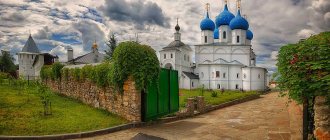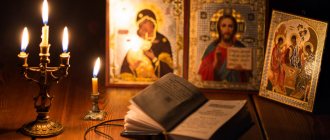Monasticism for most worldly people is an unacceptable path in life. And citizens far from the church do not understand at all how one can consciously and voluntarily give up entertainment, money, children, carnal pleasures and other delights of life for the sake of the Lord.
A stereotype has taken root in society that going to a monastery is the end, a stupid funeral of oneself within four walls, a place where unhappy people go who have failed to realize themselves and find their purpose. How are things really going, who goes to the monastery and why?
What is monasticism?
Photo: Pravoslavie.ru
Monasticism is a special way of saving the soul, voluntary martyrdom, a Christian devotes his entire life to serving God. The Monk John Climacus said that a monk is a warrior of Christ who constantly wages a spiritual battle with his passions for the sake of the Kingdom of Heaven.
Before a person becomes a monk (nun), he lives and works in a monastery, sometimes for several years, to make sure that he is not mistaken in his choice. Some novices return to the secular world, and those who remain take monastic vows and take 3 vows:
- Obediences. A person renounces his own will and undertakes to obey his spiritual father and abbot (the head of the monastery);
- Chastity (renunciation of marriage);
- Non-covetousness. Monks have no property.
After tonsure, the monks live in the monastery, caring for the salvation of the soul and the good of the monastery.
The Monk Barsanuphius of Optina in his memoirs says that when asked about monasticism, Father Ambrose answered: “Monasticism is bliss.”
What are they doing there?
If you think that the main concern of the people living in the monastery is prayers, then I will tell you that this is not entirely true.
Yes, they spend a lot of time on spiritual improvement, but they work more for the benefit of the monastery. The point of being there is for you to forget your past life, to renounce your will, your “I”. If you have driven yourself into a corner in ordinary life or have come to the conclusion that you need something else, then of course it is better to abandon such will - it has already done its job. And hard physical work contributes to oblivion. If you doubt that you are ready to give your life into the hands of the clergy, then you can activate a kind of trial period - labor.
Essentially, you will be a hired worker on the territory of the monastery. Praying and performing spiritual processes are not necessary. You will live and eat there, in return you will have to work constantly. By completing assignments, you will be able to understand whether you are ready to move to the next level: cope with the volume of work that will be with you for the rest of your life, and ultimately move from physical labor to spiritual labor.
Further, if you are still determined, you can become a novice. To do this, you need to live in a monastery for some time and obtain permission for this “promotion.” Now the word “tasks” for you is transformed into “obediences” - this is the name of any work in the monastery. Your worldly name still remains with you, but you will already receive permission to wear some attributes of the Orthodox faith. You begin to get used to the full daily routine in the monastery and accept all the features of such a life, but without yet taking monastic vows. It is worth saying that during this period your communication with the outside world practically stops.
If your probationary period is completed successfully (usually about 5 years), then you can ask for permission to become a monk. That is, you will be symbolically given a new name, you will take a vow and put on a cassock. Now until your death you will live within the walls of the monastery, work and pray. Just eat, pray, love (work).
From all this we can highlight the main pros and cons of joining a monastery.
What is wrong:
- Work a lot and pray a lot with almost no days off. Be prepared that such monotony will accompany you for the rest of your life. And it’s hard not only mentally, but also physically;
- Strict routine. The life of monks is regulated and scheduled by the hour. For any disobedience you will be punished. The management here is even stricter than usual. For example, for misconduct they can be sent to dirty work;
- Forget about your skills and specialty. Even if you are a super programmer and interned at Google, there will still be a kitchen, a vegetable garden and a barnyard waiting for you here;
- You are nobody. You will have to deny yourself. Forget about the joys of ordinary life too. If your ego is not ready for this, then go home.
But there are also advantages:
- You will have wise mentors and “colleagues.” People who spent many years in the monastery have a lot to tell. They themselves have already answered almost all the questions to which you are just looking for answers;
- Giving up on yourself is not always a bad thing. You could drive life into the darkest place. You are no longer your own friend. Sometimes it’s better to be able to part with yourself. It is not for nothing that people who want to get rid of any addictions are taught to renounce their consciousness and are accustomed to many actions that are performed at the subconscious level;
- Self improvement. Despite your busy schedule and many worries, you will also have your own time when you, exhausted after a hard day, can think about your development. Because worldly worries will not bother your head here;
- Spiritual development. If you are a religious person, then, of course, the local rhythm of life can open up a lot for you. For some, the Bible contains all the answers. Maybe she will open something new for you too.
Reasons why entering a monastery may turn out to be a mistake
Photo: Valaam.ru
- The monks will be saved, but the laity will not. Incorrect statement. Monasticism and marriage are paths to salvation. A person himself chooses which way to go;
- Tragedy or unhappy love. Then accepting monasticism is not a conscious step, but an escape from reality;
- New zeal or “neophyte”. When a person just comes to faith, he “lights up” on the monastic path,” presenting it as an ideal for the salvation of the soul. It is important to remember that after some time the impulse may pass;
- Career. There is no place for ambition in monasticism. Each monk must engage in the obedience to which he has been assigned, without expecting promotion in the “service.”
What is monasticism? Why is it even needed? And who should leave the world and who should not?
It is not for the sake of peace and prosperity that we have settled here,
dear brethren, but for the sake of struggle, for the sake of severe warfare... We have gathered in this quiet abode of the spirit in order to tirelessly crush our passions day after day
. St. Faustus of Lerins
On January 30th, according to the new style, the Church honors memory of the founder of monasticism, St.
Anthony the Great. However, until now, for quite a large number of Orthodox believers (not to mention non-church people), the act of St. Antonia looks, at a minimum, strange, and at most, stupid. Well, think for yourself: a young, rich young man full of vitality and energy, which the Venerable was. Anthony, instead of turning his life and his fortune to serving his neighbors, one fine moment enters the Church and hears a Gospel reading on the topic: “... if you want to be perfect, go, sell your property and give it to the poor; and you will have treasure in heaven; and come and follow Me"
(Matthew 19:21). After which he literally fulfills this recommendation of the Savior and moves away from people into the desert.
I am sure that in our secular age, in the age of complete and unconditional acquisition, such an act will not cause anything in people except condemnation or bewildered surprise.
Indeed, today in modern society we can observe a pronounced negative attitude towards Orthodox monasticism. Most often, monks are accused of cowardice, fear of life's difficulties and avoidance of reality. However, as was already said above, we often have to face a situation where not only non-believers, but also Orthodox Christians do not always understand the essence of monastic work.
Misconceptions about monastic work
Usually among Orthodox Christians, monasticism is considered a special path of salvation, the destiny of a small number of people prone to lonely life and self-isolation.
At the same time, monks, as a rule, are credited with certain “special” spiritual gifts (prayer for the whole world, seeing spirits, casting out demons, etc.), which are “automatically” given to a person by the Holy Spirit during monastic tonsure. In this regard, the stereotype has become firmly established among the people that the main thing in the life of monks is prayer for the whole world, and that the prayer of a monk is stronger than the prayer of a layman. It is for this reason that we can so often observe how believers endlessly travel to monasteries in search of healing and even improvement of their material condition. At the same time, among some Orthodox Christians, the passion for pilgrimage takes on threatening forms: a person can abandon his parish, forget about loved ones and relatives, forget about spiritual life and the fight against passions and sin. The entrenchment of this false stereotype also hinders the monks themselves. Back in the 19th century, St. Philaret (Drozdov) and St. Ignatius (Brianchaninov) noted some negative trends among Russian monasticism, which often led to a complete distortion of the essence of monastic work.
Saint Philaret wrote with bitterness: “How boring it is to see that monasteries all want pilgrims, that is, they themselves seek entertainment and temptation. True, they sometimes lack methods, but what they lack more is non-covetousness, simplicity, hope in God and a taste for silence.”
.
Today, many experienced Orthodox people warn: “Putting hope in holy places, in angels and monks is, at the very least, naive, and in essence, deeply mistaken. Unfortunately, the pagan idea is winning over the Christian idea, and we “safely” replace holy life with holy places.”
(Prof. A.I. Osipov).
Christ gave the same commandments to all people
But if holy people denounce all these prejudices, if they constantly insist that Christ gave the same commandments to all people, that Christ did not divide people into monks and laity, that grace is the same as in a rural or city church , so in the monastery, and that the acquisition of grace does not depend on the place, but on the purity of the heart (by the way, for this reason, some saints did not bless people on pilgrimage even to Jerusalem), then it would be quite reasonable to ask the question: what then does it consist of? the essence of monastic work, and how does it actually differ from the worldly path?
Throughout Christian history, the Orthodox Church calls its faithful children to one goal - ACHIEVEMENT OF CHRISTIAN PERFECTION, by changing themselves from the old state into the New Man - in the Image of Christ!
“We should recognize as an axiom, as a starting point, the following proposition: monasticism does not stand with any special ideal different from the general Christian ideal. There can be no special ideal at all, because the ideal of Christ is eternal, unchangeable and infinite.”
(St. Hilarion (Trinity)).
However, the paths of monks and lay people to achieve perfection are different. In the race for material wealth, rarely does anyone manage to rest their soul and remember God. Constant concern for daily bread, for the well-being of family and friends forces a person to plunge headlong into a world of passions and temptations, from which rarely anyone manages to escape. People save money for apartments, cars, equipment, dress and educate children, help parents, go on vacation, defend diplomas and scientific degrees, experience problems at work - and in all this bustle, God is always in the background (and I am describing the best option, but there are also personal problems, and just tragedies, etc.).
In themselves, all these worries are a normal phenomenon, but the trouble is that all this vanity brings complete discord into a person’s spiritual life. Living among the bustle, a person, voluntarily or unwittingly, is drawn into the general stream of worldly life, while losing the guidelines of Christian life and sobriety in relation to his shortcomings. This often leads to the fact that people become unable to distinguish vice from virtue, and for many passions become a completely normal phenomenon. At the same time, Christian life comes down to just going to church on Sunday. And even here, many, rather, remain Christians only during divine services, and outside the walls of the temple they rush to disappear into the vanity of the world. Concerts and sports shows, festive feasts and folk festivals, trips and visits to relatives, shopping and markets, fashion and the desire for bright impressions... - this is what excites our imagination and draws us to ourselves. And in this we are actually no different from the pagans, about whom the apostle wrote: “But all the Athenians and the foreigners living among them did not spend their time doing anything better than talking or listening to something new.”
(Acts 17:21).
At the same time, sinful and sensual images and thoughts almost completely occupy our soul (in which there is a constant internal dialogue with sinful and vain thoughts). One has only to carefully observe oneself, and any person can easily see that inside himself he is constantly busy worrying about business, discussing and judging people, thoughts of vanity, narcissism, etc. Alas, even during prayer it is very difficult to get rid of these thoughts.
Such a life, as a rule, leads to the fact that in old age people completely fall under the power of passions, vanity and worldly concerns. In such a state, a person is not capable of seeing his sin, is not able to give a sober assessment of his spiritual state, and is not capable of repentance. Repentance is replaced by SELF-JUSTIFICATION, which, according to the apt expression of St. Barsanuphius the Great means the LIMIT OF THE DEVELOPMENT OF PASSIONS IN MAN, or rather, a complete departure from the Truth, removal from Christ! Unfortunately, such a person no longer resembles a Christian, but a “believing demon,” because “and the demons believe and tremble” (James 2:19).
That is why, realizing the many dangers that await a person in worldly life, true believers Christians always kindly envy monks and try to learn from them the basics of spiritual life and the fight against passions. And that is why the Church says that the LIGHT OF THE LAYERS ARE MONKS!
Monasticism is the shortest path to achieving Christian perfection
We all must go to the Truth, to Christ. And in this sense, monasticism is the shortest and most convenient way of unity with God. On this path, nothing should distract a person from the main goal of his life - salvation in Christ: neither family, nor property, nor worries about worldly things, etc. No wonder St. Cassian the Roman wrote: “A monk is a person for whom only he and God exist
.
Feeling sick and damaged, he does not waste time on self-medication and fuss; Feeling sick, he is not satisfied with rare visits to the hospital (Church), as the laity do. The monk consciously isolates himself from the world, completely surrendering to the power of the Doctor-Christ, completely devoting his life to the treatment of sin and passions.
The centuries-old experience of the Church shows that many people, living a real ascetic life, actually reached the heights of spiritual perfection. Having conquered passions within themselves and implanted Christian virtues in their place, these people became capable of truly accepting the Grace of God in their hearts. For the human heart is the place where the meeting of God and man takes place.
Saint John Chrysostom wrote about monastic work:
“There we will see this height of humility. There, people who previously shone with worldly honors or were famous for their wealth now embarrass themselves in everything: they have neither good clothes, nor comfortable homes, nor servants, and, as if in writing, clearly depict humility in everything. Everything that contributes to the arousal of pride, such as lush clothes, magnificent houses, many servants, which involuntarily inclines some to pride - all this is removed from there. They make the fire themselves, chop the wood themselves, cook the food themselves, and serve those who come. There you will not hear anyone insulting another, you will not see anyone being insulted; there are neither those who take orders nor those who give orders; All the servants are there, and each one washes the feet of the pilgrims and one before the other tries to provide them with this service. And they do this without distinguishing who came to them: a slave or a free one, but they serve everyone equally. There are neither big nor small. What? So there is no subordination there? On the contrary, excellent order prevails there. Although there are lower ones there, the higher one does not look at this, but considers himself lower than them, and through this he becomes greater.
Everyone has one table - those who use the services and those who serve them; everyone has the same food, the same clothing, the same home, the same way of life. The greater one is the one who warns the other in doing the lowest works. There is no difference between mine and yours, and from there these very words, which serve as the cause of countless strife, are expelled. And why are you surprised that the hermits have the same way of life, the same food and clothing, when they all have the same soul, not only by nature, but also by love? And in that case, how can he ever become proud of himself? There is neither poverty nor wealth, there is neither glory nor dishonor. How can pride and arrogance creep in? There are those who are lower and those who are higher in virtue; but, as I already said, no one there looks at their superiority... There is no crowd of flatterers and parasites there, moreover, they don’t even know what flattery is. So, what could give them pride? They have great equality in everything, and therefore they very comfortably succeed in virtue. Indeed, such equality is much more conducive to the learning of the inferiors than if they were involuntarily forced to yield primacy to the superiors.
However, their very exercises lead them to humility and do not allow them to become arrogant. In fact, tell me, who, engaged in digging the earth, watering and planting plants, weaving baskets and knitting hair shirts, or any other similar work, will think highly of himself? Who, living in poverty and struggling with hunger, will be affected by this disease? Nobody. That is why it is easy for them to be humble. Just as it is difficult to maintain modesty here due to the multitude of applauding and surprised people, so there it is very convenient. The hermit is occupied only by the desert: he sees flying birds, trees swayed by the wind, the blowing of zephyr, streams flowing quickly through the valleys. So, what can a person living in such a desert be proud of?”
Of course, worldly people are unlikely to be able to understand and experience the states experienced by a person who has achieved Christian dispassion. Usually we tend to confuse the effect of grace with that sensual tenderness that arises in the soul from visiting church and worship. And here the experience of the saints helps us to distinguish those that are clearly charming, i.e. false spiritual states, from the true action of Divine Grace.
Saint Ignatius Brianchaninov describes this action as follows: “The Holy Fathers of the Eastern Church, especially the desert dwellers, when they reached the height of spiritual exercises, then all these exercises merged into one repentance. Repentance embraced their entire life, all their activity: it was a consequence of seeing their sin... The ascetic will just begin to fulfill the Commandments of the Gospel, when he will see that he is fulfilling them very insufficiently, uncleanly: intensified activity according to the Gospel reveals to him more and more clearly the insufficiency of his good deeds , the multitude of his deviations and impulses, the unhappy state of his fallen nature: He recognizes his fulfillment of the commandments as a distortion and desecration of them.”
.
Thus, examining their lives, true Christian ascetics discovered in themselves many sins and passionate movements of the soul. Seeing such a huge number of shortcomings in themselves, they considered themselves the worst of people, and even washed their virtues, like sins, with streams of tears.
It is this state that contributes to the development of true love for people in a person, because... all people begin to be perceived by such a person as better than himself. A monk, when he leads a correct spiritual life, learns true love for people (love in which there is no egoism), and this happens because true love is the Gift of the Holy Spirit! And the Holy Spirit can teach a person TRUE LOVE FOR PEOPLE only when he has CLEANSED HIS HEART OF PASSIONS.
In Orthodoxy, the truly grace-filled state of a person is called JOYFUL-SAD CRYING. Figuratively, this state can be likened to the state of a seriously ill person who, despite a negative diagnosis, continues to strictly follow all the instructions of the Doctor (Christ) and thereby receives firm hope for healing. It is in this state that a person is able to reevaluate his life and feel its real value and beauty. Usually they say about such people: “It’s like being born again.”
Of course, the laity sometimes manages (most often in the Sacraments of the Church) to feel the action of God’s Grace in their souls! And yet, most people are able to retain this blessed feeling only for a short time. That is why, living in such a difficult time for Orthodoxy, it is so important to learn from the experience of Christian ascetics (monks).
Saint Ignatius Brianchaninov wrote: “According to the teaching of the fathers, living... the only one appropriate for our time is living under the guidance of the fatherly writings with the advice of successful modern brethren; this advice must again be checked according to the writings of the fathers..."
Should city people retire to the desert?
Does this mean that lay people, just like monks, should retire to the desert and uninhabited places? This question is answered perfectly by St. John Chrysostom: “Well, someone will say, do all those living in the cities perish and become overwhelmed, and must, leaving the cities deserted, move to the desert and live on the tops of the mountains?... No, on the contrary, I, as I said before, and I wish and pray that we would enjoy such a peace, and that the tyranny of these evils would be so destroyed that not only those living in the cities would not need to retire to the mountains, but those living in the deserts, like fugitives long hidden, would return again to their city.”
.
However, despite this, Saint John still gives preference to the monastic method of salvation, calling it more convenient and perfect, and calls on the laity to lead an ascetic life as a sure means of combating passions: “All people should ascend to the same height; It is precisely this that has distorted the entire universe, that we think that only the monastic needs greater severity of life, while others can live carelessly... If we planted this fruit in the cities, if decorum became the law and principle, and if we put our children first another was taught to be friends of God and taught instead of all and before all other spiritual sciences, then all sorrows would cease, the present life would get rid of countless evils, and what is said about the future life, i.e. If we had escaped sickness and sorrow and groaning (Isa. 35:10), we would have had it all here.
If we had no addiction to money or empty fame, if we were not afraid of death or poverty, if we considered sorrow not an evil, but the greatest good, if we knew neither enmity nor hatred, then we would not suffer from their own, nor from other people’s sorrows, but the human race would approach the angels themselves. But, someone will say, which person has achieved such perfection? You, of course, will not believe this, living in cities and not reading divine books; but if you knew those living in the deserts and the ancients mentioned in spiritual books, you would be convinced that the monks, and before them the apostles, and before these (Old Testament) righteous people, were distinguished with all fidelity by such wisdom.”
.
What kind of people go to a monastery and why?
Photo: Elitsy.ru
The confessor of the Novo-Tikhvin Monastery, schema-abbot Abraham says that people of different social status and ages come to the monastery. Many intelligent and young people. What drives them to the monastery is the desire to devote their lives to the Lord, to repent, and the desire to live according to the teachings of the holy fathers.
There is no doubt that the life of a monk is full of difficulties, but it provides an opportunity to “improve in virtues” (Archpriest Alexander Lebedev) and get closer to God.
Preparation for monastic life
Monk - translated from Greek means “lonely” and in Rus' they were called monks - from the word “other”, “different”. Monastic life is not contempt for the world, its colors and admiration for life, but a renunciation of harmful passions and sin, pleasures and carnal pleasures. Monasticism serves to restore the original purity and sinlessness that Adam and Eve were endowed with in heaven.
Yes, this is a difficult and difficult path, but the reward is great: imitation of the image of Christ, boundless joy in God, the ability to gratefully accept everything that the Lord sends. In addition, monks are the first prayer books for the sinful world. As long as their prayer sounds, the world stands still. This is the main task of monks: to pray for the whole world.
While a man or woman lives in the world, but with all his soul feels that their place is in the monastery, they have time to prepare and make the right and final choice between worldly life and life in unity with God:
- First, you must be an Orthodox Christian;
- Visit the temple, but not formally, but feel your soul in the services and fall in love with them;
- Follow the morning and evening prayer rule;
- Learn to observe physical and spiritual fasting;
- Celebrate Orthodox holidays;
- Read spiritual literature, the lives of saints and make sure that you know books written by saints that tell about monastic life, the history of monasticism;
- Find a spiritual mentor who will tell you about true monasticism, dispel myths about life in a monastery and give you a blessing to serve God;
- Make pilgrimages to different monasteries, be hardworking, remain obedient.
About Orthodox monasteries:
- Annunciation Monastery in Nizhny Novgorod
- Kazan Convent in Yaroslavl
- Kazan Monastery in Tambov
Who can enter a monastery
The inability to live without God brings a man or woman to the monastery walls. They do not run away from people, but follow salvation, the inner need for repentance.
But there are obstacles to entering the monastery; not everyone can be blessed to become a monk.
How and who can enter a monastery?
Photo: Vologda-mitropolia.ru
Each monk has his own story of entering a special path in life. However, modern people who have left worldly life and the monks who lived in ancient times are united by some special action of God’s Providence, which prompted a person to renounce the world.
Abbess Magdalena (Dosmanova) (abbess of the Novo-Tikhvin Monastery in 1918) said: “I accept into the monastery not those who cannot live in the world, but those who cannot live without God.”
Obstacles to entering the monastery are:
- Marriage;
- Minor children;
- Sometimes old age.
Every person who comes to a monastery with the intention of becoming a monk first lives at the monastery as a pilgrim (from several days to several months). Then she becomes fully involved in the life of the monastic community, like a brother (sister), and a year later becomes a novice (novice). Such a long period is necessary for a person to take a closer look at the way of monastic life and test the firmness of his intention to leave the world. The duration of the test is regulated by the abbot in consultation with the confessor. Only then is tonsure performed - a special rite from which monastic life begins.
Avoiding problems
If a person enters a monastery thoughtlessly, he will be greatly disappointed. The path of a monk is a worthy and high choice, but it requires great responsibility and awareness of the need to live in the name of God and love. People connected by family ties or with young children will not be accepted into the monastery. Anyone who thinks that life in a monastery will save you from failures and difficulties is mistaken.
Running away from yourself, from the problems that have piled up, will not save you from an identity crisis. You need to stop in time and think about what led to the deterioration of your life circumstances. You need to rewind the events in reverse order and carefully analyze the chronology and unbiasedly analyze the reasons.
The heart will tell you where the mistakes were made. The monastery is not going anywhere, but your own life is leaving and you need to figure it out yourself. Do not think that with death, mistakes, sins, grievances, and fears will disappear. No, they will pass on to your children in the form of negative karma, which they will have to work off. Space cannot tolerate emptiness.
When you turn your face to a problem, break it down into small components and solve it step by step, then in reality it always turns out that its magnitude is exaggerated by your own conjectures and fear. Life on Earth is designed so that humanity continuously develops. Living in conditions where there is plenty of everything, without knowing grief and hardship, people begin to degrade, because they have nothing to strive for.
The Creator loves us immensely and continually bestows trials so that we grow and evolve spiritually into co-Creators, lights of life. Therefore, do not run away from yourself, but rather start working on your mistakes, change yourself, and the world around you will become friendly, bright, and joyful. There is no other way to happiness.
What do monks do?
Photo: Monasterium.ru
The meaning of monastic life is work and prayer. Currently, monasteries, in addition to daily services and prayer, are engaged in social and educational activities. Many monasteries practice subsistence farming. Then they sell products of their own production (baptismal sets, scarves, candles, coal, icons, rosaries, books, etc.).
Degrees of monasticism
The monastic path has several degrees, but speaking in the most general terms, there are three stages (if not two):
- Preparation (worker, novice)
- Monasticism
- Schema monasticism (more correctly - schema)
Preparation for monasticism can last for several years - there have been cases when a person remained a novice almost his entire life.
Consecration as a monk occurs only when the abbot of the monastery is unconditionally convinced that monasticism is truly a calling for this person, and not his emotional or situational choice. There will be no turning back: returning “to the world” is tantamount, so to speak, to suicide.
The abbot needs a lot of experience and spiritual wisdom to understand whether the moment has come for tonsure or whether he needs to wait a little longer and “check” the person. At the same time, the novice, of course, can be sure that he was created for monasticism, but years will pass, the initial spiritual “ardor” will subside, and life in the monastery will become for him not liberation from the world, but grief.
To be tonsured into the schema is the highest degree of monasticism—“equal to the angels.” It implies that the monk is freed from all external obediences (in other words, he goes “in seclusion”, although for this he need not be a schemamonk), and his only and unceasing activity becomes prayer. In the Russian tradition, as a rule, the oldest monks are tonsured into the schema.
photo (c):
Time for reflection: laborer and novice
To choose a monastery in which a future monk will stay, they make more than one trip to holy places. When visiting one monastery, it is difficult to determine that a person’s heart will remain here to serve God.
After remaining in the monastery for several weeks, the man or woman is assigned the role of laborer.
During this period a person:
- prays a lot, confesses;
- works for the benefit of the monastery;
- gradually comprehends the basics of monastic life.
The worker lives at the monastery and eats here. At this stage, the monastery takes a closer look at him, and if the person remains faithful to his vocation of monasticism, he is offered to remain in the monastery as a novice - a person preparing to be tonsured as a monk and undergoing a spiritual test in the monastery.
Important: obedience is a Christian virtue, a monastic vow, a test, the whole meaning of which comes down to the liberation of the soul, and not to slavery. The essence and importance of obedience must be understood and felt. Understand that everything is done for good, and not for torment. By performing obedience, they understand that the elder, who is responsible for the future monk, cares about the salvation of his soul.
In case of unbearable trials, when the spirit weakens, you can always turn to your elder and tell about the difficulties. And unceasing prayer to God is the first assistant in strengthening the spirit.
You can be a novice for many years. Whether a person is ready to become a monk is decided by the confessor. At the stage of obedience there is still time to think about the future life.
The bishop or abbot of the monastery performs the rite of monastic tonsure. After tonsure there is no turning back: moving away from passions, sorrows and embarrassment leads to an inextricable connection with God.
Important: do not rush, do not rush to accept monasticism. Impulsive impulses, inexperience, and ardor are falsely taken for a true calling to be a monk. And then a person begins to worry, despondency, melancholy, and run away from the monastery. The vows are made and no one can break them. And life turns into torture.
Therefore, the main instruction of the holy fathers is careful obedience and testing for a certain period of time, which will show the true intention to be called to monasticism.
Vestments for tonsure
The cutting of hair and the giving of a name ends with the dressing (vestment) of the tonsured person in monastic robes. The abbot presents things in a certain order, while explaining their spiritual meaning. The clothes of the monks are like the armor of warriors going to the battlefield. The monk also enters the battle, only of a spiritual nature the “power of truth” is acquired with a leather belt. The mantle acts as the “armor of righteousness.” The hood is a “helmet of salvation.” The rosary is “the sword of the Spirit, which is the word of God.” The sandals are a sign that he is “going” to testify for Christ.
Each new stage of ascent to God (that is, successive monastic degrees) gives the monk more “means” for spiritual struggle. This is reflected in his appearance. The monastic robe is extremely simple in cut. Its black color is intended to remind of death, humility, solitude and repentance.
“Putting on monastic robes is a sacrament, just like the laying on of crowns in marriage. You put on monastic robes instead of crowns. And so you are disheartened by Christ, taking a vow of virginity for the rest of your life” (Elder Joseph of Athos, 1898-1959).











